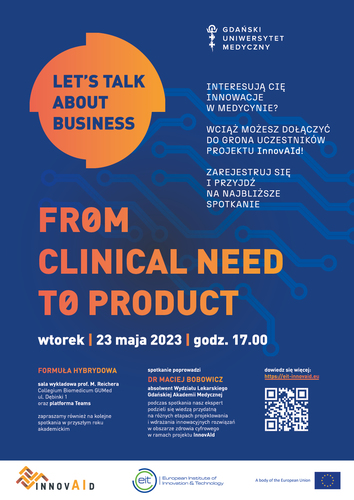Artificial intelligence in oncology
16.05.2023
The goal of the consortium, which also includes the Medical University of Gdansk, is to create a European scientific platform integrating radiological research with clinical data, based on next-generation artificial intelligence for targeted medicine in oncology. The result of cooperation between scientists and clinicians within the framework of the “EuCanImage” project will include recommendations and guidelines for the creation and verification of artificial intelligence, that can become the basis for developing a diagnostic and treatment decision support system in selected neoplastic diseases, in accordance with the idea of precision and personalized medicine.

What does working on such a venture look like? What are the different steps involved in designing and implementing innovative digital health solutions? This will be the subject of a lecture for the participants at the May meeting of the InnovAId: From clinical need to product project, given by Maciej Bobowicz, Ph.D. of the Department of Oncologic Surgery at MUG, an enthusiast for the responsible use of artificial intelligence potential in medicine, with a particular focus on neoplastic disease imaging. Dr. Bobowicz is the head of the clinical part of the “EuCanImage” research project, funded by the European Commission through the Horizon 2020 initiative.
The meeting will be held in a hybrid format, on Tuesday, May 23, 2023, at 5 pm CET at the Prof. M. Reicher Lecture Hall (MUG Collegium Biomedicum, 1 Dębinki Street), and through Teams platform (link will be provided after registration at https://forms.office.com/pages/responsepage.aspx?id=n1qaLbdpQEmhpq9V81ugaSAlOZ0GN3dAq2Ag3dAISmJUN1k4UldCWFkxS1JKNE1VQlJLWE5OTFBWQy4u.
What is the project all about?
The starting point will be to put the data of more than 25,000 patients on the EuCanImage platform. This will enable research in “unmet clinical needs,” including detection of small primary liver tumor lesions or secondary metastatic lesions in colorectal cancer. Researchers are also interested in defining molecular subtypes of breast cancer, and predicting their response to treatment.
The next step will be to link the platform to biological repositories and healthcare systems to develop multidimensional artificial intelligence tools that integrate data at the clinical, radiological, tissue and molecular levels with other available predictive factors. This will enable creating an individual tumor model for each patient (analogous to a fingerprint). The platform’s developers will draw on the experience of previous initiatives related to data accessibility and openness for personalized medicine research.
